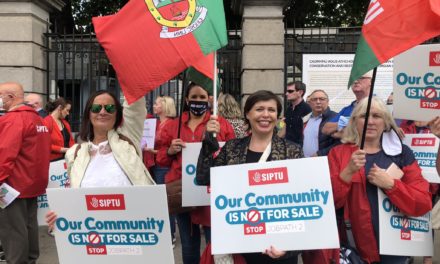“For every member of staff freshly recruited, another experienced staff member is walking out the door. The situation is both unacceptable and unsustainable,” says Trade union Fórsa, complaining about unequal pay and conditions.
Last Thursday (Jan 26) the trade union moved towards “indefinite strike action” involving hundreds of its members working in community and voluntary sector health services across the country. It is not immediate, however, nor is every county certain to be impacted.
The community-based services included in the proposal for strike action are HSE-funded and the latest move follows limited strike action on a limited number of days last year.
The move follows years of complaints from staff in the sector regarding inequality in relation to pay and conditions.
Fórsa general secretary and Irish Congress of Trade Unions (ICTU) president Kevin Callinan said: “As one of the main representative unions involved, Fórsa has decided to call time on the Government’s dragging of its own feet on this issue.”
Saying that services “will simply be brought to a halt”, he added: “At this stage, no other course of action will drive the point home.”
The union intends to ballot members shortly about a start date and specific locations for the strikes and it has pledged to cover the wage costs of the staff taking part in the strike.
Mr Callinan stated that the ongoing pay inequality in the sector “simply cannot be sustained”.
He added: “Up to a third of experienced professional health and care staff are leaving their jobs in these agencies every year to take up better remunerated employment with the HSE and elsewhere.”
Mr Callinan added that while limited strike action by Fórsa members in Galway, Mayo, Cork and Kerry last year garnered strong support across the political spectrum, neither the Government, Department of Health or the HSE have since taken any meaningful action to address the issue.
He added:
“On the one hand, the health minister acknowledged in the Dáil last October that the Government is the ‘main and often sole funder’ of these organisations, and that its funding affects the ability of agencies to improve pay and conditions.
“On the other hand, it has spectacularly failed to grasp the link between its chronic underfunding of the services and the subsequent failure to meet the HSE’s recruitment targets in, for example, disability services. For every member of staff freshly recruited, another experienced staff member is walking out the door. The situation is both unacceptable and unsustainable.”
Fórsa said that it has conducted research which revealed that recruitment and retention of professional health staff in these employments has become a major challenge. The union said Section 39 employers are burdened with higher recruitment costs and growing waiting lists for services.
‘Section 39’ agencies provide a range of residential and day services for people with disabilities, mental health, addiction, domestic and sexual violence services, and other supports, under service level agreements with the HSE. Section 56 agencies operate in a similar way for Tusla-funded children’s services.
While these agencies are funded by the state, their employees in a range of health professional, clinical, clerical and administrative grades, are on lesser terms and conditions than their HSE counterparts.




